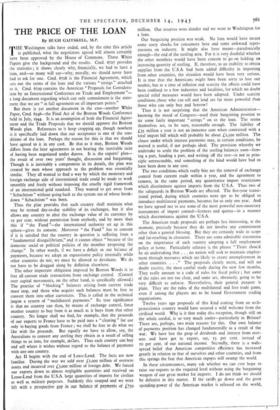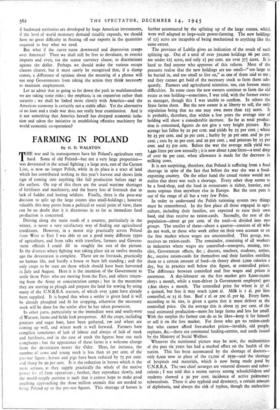THE PRICE OF THE LOAN
By HUGH GAITSKELL, M.P.
THE Washington talks have ended, and, by the time this article is published, what the negotiators agreed will almost certainly have been approved by the House of Commons. Three White Papers give the background and the results. Cmd. 6707 provides the statistics ; it shows clearly why, financially, we had to have a loan, and—so many will say—why, morally, we should never have had to ask for one. Cmd. 6708 is the Financial Agreement, which sets out the terms of the loan and the various " strings " attached to it. Cmd. 67o9 contains the American " Proposals for Considera- tion by an International Conference on Trade and Employment "- a long document regarding which our only commitment is the state- ment that we are " in full agreement on all important points."
But there is yet another document in the case—another White Paper, Cmd. 6546—the Final Act of the Bretton Woods Conference held in July, 1944. It is an assumption of both the Financial Agree- ment and the Trade Proposals that we should approve the Bretton Woods plan. References to it keep cropping up, though nowhere is it specifically laid down that our acceptance is one of the con- ditions of the loan. Perhaps the reason for this is that we should have agreed to it in any case. Be that as it may, Bretton Woods differs from the later agreements in not bearing the inevitable taint of having been negotiated under duress. It is the experts' plan— the result of over two years' thought, discussion and bargaining. Though it is inevitably a compromise in its details, the plan was created by men whose approach to the problem was essentially similar. They all wanted to find a way by which the monetary and foreign exchange side of international trade could be made to work smoothly and freely without imposing the cruelly rigid framework of an international gold standard. They wanted to get away from " Schachtism" without going back to the system out of whose break- down " Schachtism " was born.
Thus the plan provides that each country shall maintain what may be termed day-to-day stability of its exchanges, but it also allows any country to alter the exchange value of its currency by to per cent. without permission from anybody, and by more than this if " the Fund "—the international authority set up in this sphere—gives its consent. Moreover " the Fund " has to consent if it is satisfied that the country in question is suffering from a " fundamental disequilibrium," and it cannot object " because of the domestic social or political policies of the member proposing the change." In other words, if we have a deficit in our balance of payments, because we adopt an expansionist policy internally while other countries do not, we must be allowed to devaluate. We do not have to be dragged along by deflation elsewhere.
The other important obligation imposed by Bretton Woods is to free all current trade transactions from exchange control. (Control over capital movements, on the other hand, is specifically allowed.) The practice of " blocking " balances arising from current trade must stop, and those who acquire such balances must be free to convert them into other currencies. This is called in the technical jargon a system of "multilateral payments." Its true significance is that no country can then, by means of exchange control, force another country to buy from it as much as it buys from that other country. No longer shall we find, for example, that the proceeds of our exports to France have to be paid into a " clearing " for use only in buying goods from France ; we shall be free to do what we like with the proceeds. But equally we have to allow, say, the Australians to convert any sterling they obtain as a result of selling things to us into, for example, dollars. Thus each country can buy and sell where it wishes without regard to the balance of payments with any one country.
Act II begirfs with the end of Lease-Lend. The facts are now familiar. During the war we sold over LI,000 million of overseas assets and incurred over £3,c00 million of foreign debt. We forced our exports down to almost negligible quantities and received on Lease-Lend from the U.S.A. large quantities of imports for civilian as well as military purposes. Suddenly this stopped and we were left with a prospective gap in our balance of payments of £750
million. Our reserves were slender and we went to Washington for a loan.
Our bargaining position was weak. No loan would have meant some nasty shocks for consumers here and some awkward reper- cussions on industry. It might also have meant—paradoxically enough—the end of the sterling area. For it is very doubtful whether the other members would have been content to go on holding an increasing quantity of sterling. If, therefore, to an inability to obtain supplies from the U.S.A. had been added difficulty in importing from other countries, the situation would have been very serious. It is true that the Americans might have been sorry to lose our market, but at a time of inflation and scarcity the effects could have been confined to a few industries and localities, for which no doubt special relief measures would have been adopted. Under scarcity conditions .those who can sell and lend are far more powerful than those who can only buy and borrow!
Thus it is not surprising that the American Administration— knowing the mood of Congress—used their bargaining position to tie some fairly important " strings " on to the loan. The terms themselves are, to be sure, reasonable enough. The liability of £35 million a year is not an immense sum when contrasted with a total import bill which will probably be about £1,5oo million. The clause under which interest payments may, in certain conditions, be waived is useful, if not perhaps ideal. The provision whereby we undertake to settle the problem of the sterling balances soon—free- ing a part, funding a part, and writing off the rest—is not in prin- ciple unreasonable, and something of the kind would have had to have been done in any case.
The two conditions which really bite are the removal of exchange control from current trade within a year, and the agreement to remove, in the same period, any quantitative import restrictions which discriminate against imports from the U.S.A. Thus two of the safeguards in Bretton Woods are affected. The five-year transi- tional period, during which countries were not to be obliged to introduce multilateral payments, becomes for us only one year. And we have agreed not to use some of the most powerful non-monetary instruments of import control—licences and quotas—in a manner which discriminates against the U.S.A.
The American trade proposals are perhaps less interesting, at the moment, precisely because they do not involve any commitment other than a general blessing. But they are certainly wide in scope and far-reaching in character. There are some admirable statements on the importance of each country adopting a full employment policy at home. Particularly salutary is the phrase " There should be an undertaking that . . . no nation will seek to maintain employ- ment through measures which are likely to create unemployment in other countries. . . ." The proposals clearly merit, and will no doubt receive, the most careful study during the new few months. They really amount to a code of rules for fiscal policy ; but some of the rules are not too clear, and some are, obviously, going to be very difficult to enforce. Nevertheless, their general purport is plain. They are the rules of the multilateral and free trade game, even if among the players are to be found Government trading organisations.
Twelve years ago proposals of this kind coming from an arch- protectionist country would have secured a wild welcome from the civilised world. Why is it that today this reception, though still on the whole cordial, is so very much cooler—particularly in Britain? There are, perhaps, two main reasons for this. Our own balance of payments position has changed fundamentally as a result of the war. We have lost the prop of dividends and interest from over- seas and have got to export, say, is per cent. instead of to per cent. of our national income. Secondly, there is a wide- spread belief that American competitive efficiency has increased greatly in relation to that of ourselves and other countries, and from this springs the fear that American exports will swamp the world.
In these circumstances, many ask whether we can ever hope to raise our exports to the required level without using the bargaining weapon of our great market for imports. I do not think we should be defeatist in this matter. If the tariffs go down and the great spending-power of the American market is released on the world,
if backward territories are developed by huge American investments, if the level of world monetary demand steadily expands, we should have no great difficulty in floating off our exports in the quantities required to buy what we need.
But what if the curve turns downward and depression creeps over America? Then we shall still be free to devaluate, to restrict imports and even, via the scarce currency clause, to discriminate against the dollar. Perhaps we should make the various escape clauses clearer, but it must surely be recognised that, if a slump comes, a difference of opinion about the meaning of a phrase will not stop Governments from taking the action they think necessary to maintain employment.
Let us admit that in going so far down the path to multilateralism we are taking some risks ; the emphasis is on expansion rather than security ; we shall be linked more closely with America—and the American economy is certainly not a stable affair. Yet the alternative of no loan and a trade war does not really bear examination. And is it not something that America herself has dropped economic isola- tion and taken the initiative in establishing effective machinery for world economic co-operation?



























 Previous page
Previous page